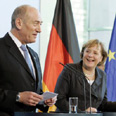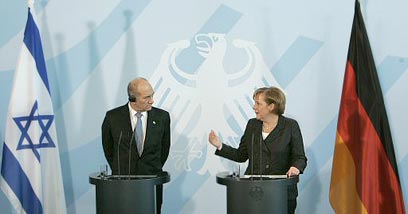
Olmert: We won’t be first to introduce nukes to region
Prime minister speaks at joint press conference with German Chancellor Angela Merkel, who promises to support sanctions against Iran. Chancellor also refers to Holocaust denial conference held in Iran, says 'we uneqiovocally reject this conference. Germany will never accept this'
Olmert referred to his slip of the tongue in an interview with German television broadcast Monday, in which he indirectly admitted that Israel possesses nuclear weapons.
"I reiterate that Israel has not changed its policy on the nuclear issue and will not be the first to introduce nuclear weapons to the Middle East. I stressed it twice in the interview I gave and I don’t think we should elaborate or hold a public discussion on this," Olmert added.
During the summit, the German chancellor declared that her country would support imposing sanctions on Iran at the United Nations Security Council, in a discussion which is scheduled to be held December 25.
"We gave Iran a good offer, but they did not respond to it so the time has come to take sanctions. We looked for a constructive approach but did not receive it, and unfortunately, the signs we are getting from there are not positive" the chancellor said, responding to an Israeli request. She rejected, however, the possibility of using the military option against the Islamic republic.
The summit in Berlin was defined as very positive by Israel, and Olmert received almost everything he asked for.

Merkel and Olmert. Successful meeting (Photo: Reuters)
During the press conference, Merkel also firmly blasted the Holocaust denial conference held in Tehran.
"I want to make it clear that we unequivocally reject the conference being held in Iran, which deals with denying the Holocaust. We completely reject this. Germany will never accept this and will use all means to fight this phenomenon," she said.
On the Iranian issue, Olmert said that Israel welcomed the international community's efforts and believed that if the steps taken are sharp and harsh, there is a chance to reach an outcome.
"I have always said that I am interested in a compromise which will prevent Iran from crossing the technological threshold for nuclear weapons, and I believe that we will reach achievement through the right efforts," he said.
Summarizing his meeting with Merkel, Olmert said, "We spoke for a long time about the situation in Iran. I was pleased to hear the unequivocal and harsh condemnation in light of the Iranian government's policy, and especially in light of the convention which is being held in Iran as we speak, aimed at denying the Holocaust.
"This conference testifies to the intolerable nature of the Iranian policy and only stresses even more the danger for the Western civilization in particular, in the existence of such a regime which aspires to obtain unconventional abilities which may be directed at many countries, including Israel."
Merkel: Palestinian gov't must recognize Israel
Merkel also addressed the Palestinian issue, stating that the conditions for making progress in a diplomatic dialogue are meeting the Quartet's terms and advancing according to the Road Map.
She said that the Palestinian government must recognize the State of Israel, renounce terror and acknowledge all the agreements signed so far between Israel and the Palestinian Authority.
"The situation in the Middle East is complex and complicated," the German chancellor said, welcoming the Israeli initiatives.
"Prime Minister Olmert's speech at Ben Gurion's grave was very important. This is a courageous move by the prime minister which shows that he is very interested in solving the problem. We in Germany want to resume and accompany the Israeli-Palestinian process, while maintaining the Quartet's conditions," Merkel said.
Addressing the Syria issue, Merkel said that there were differences of opinion on sending the German foreign minister to visit Syria, "But eventually we did not receive positive signs from Damascus as well. We wanted them to be a positive part of the game taking place in the area, but unfortunately the conditions were not realized."
Referring to the Palestinians, Olmert expressed his satisfaction with the German stance, adding that "the Quartet's conditions are an inseparable part of the basis on which the talks with the Palestinians can be held.
"It's no secret that we are holding talks in order to encourage negotiations on the basis of these principles. I believe that what is important is to strengthen the moderate elements in the Palestinian Authority in order to abide by the ceasefire, halt terror and establish a Palestinian government which will be recognized in the world and advance the diplomatic process," Olmert said.










